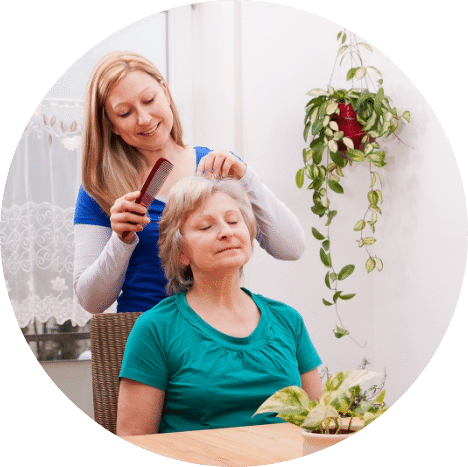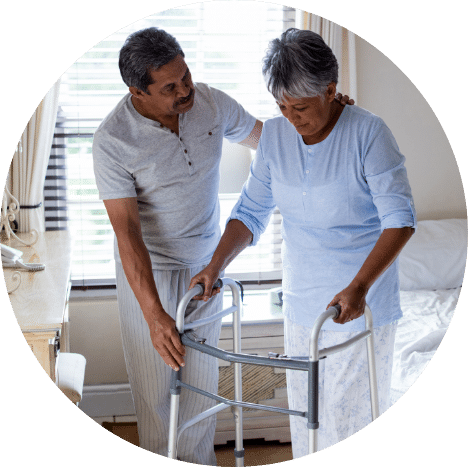Our goal is for the client to remain at home for as long as possible with maximum comfort, dignity, self-respect and to “fill the gap” between nursing home and home life. Our staff has over 100 years of experience and consists of a Director of Daily Operations, Director of Nursing, Registered Nurses, Administrative Office Staff, Certified Nursing Assistants I and II and PCS Aides who are dedicated to providing the best services possible.
Potential employees are carefully screened, including clearance through Health Care Personnel Registry and Criminal Background Checks. All employees of East Carolina Home Care receive training for their specified area of service. In order to build a respectful and trusting relationship between caregiver and client, employee and client matches are carefully made giving consideration to the needs of the client and compatibility of personalities
As people age, they may find it difficult to carry out activities of daily living (ADLs) such as bathing, dressing, grooming, eating, transferring, ambulating, and personal hygiene. Personal care, also known as custodial care, is the assistance provided by caregivers to seniors who require help with these basic activities. Personal care can be delivered in various settings, including at home, assisted living facilities, and nursing homes. This article will focus on personal care at home, exploring how it works, when it is needed, and why it is beneficial.
Personal care at home involves a trained caregiver or aide providing assistance with ADLs to seniors in the comfort of their own homes. The caregiver may be an immediate family member(1), friend, a professional caregiver hired through an agency, or, under the CAP program, an immediate family member. The caregiver’s duties may include:
Bathing, dressing, and grooming are essential activities that help seniors maintain their hygiene and dignity. A caregiver can assist with tasks such as bathing, shampooing, combing hair, shaving, and applying lotion or ointments. They can also help seniors get dressed, including selecting appropriate clothing and putting on socks, shoes, and accessories.
Seniors may require assistance with meal preparation, especially if they have difficulty using kitchen appliances or following a recipe. A caregiver can help with tasks such as grocery shopping(2), meal planning, cooking, and serving meals. They can also help seniors eat their meals, ensuring that they are getting the proper nutrition and hydration.
Transferring and ambulating refer to the ability to move from one place to another, whether it’s from a bed to a chair, or from one room to another. A caregiver can assist with tasks such as transferring the senior from the bed to a wheelchair, helping them stand up, and providing support while they walk. This can help seniors maintain their independence and prevent falls.
Personal hygiene and incontinence care involve helping seniors use the toilet or change adult diapers, if necessary. A caregiver can provide assistance with tasks such as helping the senior to the toilet, maintaining personal hygiene, and disposing of soiled garments.
We work hard to provide excellent service. Our mission, vision, values, and training allow us to shine above the rest.

Personal care at home may be needed when a senior has difficulty carrying out ADLs on their own. This may be due to physical limitations, cognitive impairments, or chronic health conditions. Some signs that a senior may need personal care assistance include:
If a senior is experiencing any of these difficulties, it may be time to consider personal care at home.
Considering home care in the Central and Eastern NC area? Our home care services are available 24/7. Learn more about how we can help.

Personal care at home not only helps seniors with activities of daily living, but it can also provide much-needed respite care for family caregivers. Respite care is temporary care provided to relieve the primary caregiver of their caregiving responsibilities for a short period of time.
When family caregivers are responsible for the care of a senior loved one, they may become overwhelmed and stressed by the demands of caregiving. This can lead to caregiver burnout, a state of physical, emotional, and mental exhaustion.
Respite care can provide family caregivers with a break from caregiving, allowing them to recharge and take care of their own needs. Personal care at home can provide respite care by offering caregivers a trained and reliable caregiver to take over their caregiving duties for a period of time.
During this time, family caregivers can take care of their own needs, such as running errands, attending appointments, or simply taking a break. This can help them feel refreshed and better able to provide quality care to their loved one when they return.
Personal care at home can also provide peace of mind for family caregivers, knowing that their loved one is in good hands while they are away. They can rest assured that their loved one is receiving the care they need and that the caregiver is trained and experienced in providing personal care services.
In addition to providing respite care, personal care at home can also help family caregivers by:
Personal care at home can help reduce the stress and burden of caregiving on family caregivers. By providing assistance with ADLs, personal care can alleviate some of the physical demands of caregiving and allow family caregivers to focus on other aspects of caregiving.
Personal care providers can communicate with family caregivers about their loved one’s care and any changes in their condition. This can help improve communication between family caregivers and their loved ones, as well as between family caregivers and healthcare providers.
Personal care providers can provide education and support to family caregivers, helping them better understand their loved one’s condition and how to provide appropriate care. They can also provide emotional support to family caregivers, helping them cope with the challenges of caregiving.
Personal care at home offers several benefits for seniors and their families. Some of these benefits include:
Personal care at home can help seniors maintain their independence by providing assistance with ADLs. With the right support, seniors can continue to live in their own homes and maintain their daily routines.
By providing assistance with ADLs, personal care at home can help seniors maintain their health, hygiene, and overall well-being. This can lead to an improved quality of life and greater satisfaction.
Many seniors are at risk of falls and injuries, especially if they have difficulty with mobility or balance. Personal care at home can help reduce this risk by providing assistance with transferring, ambulating, and other tasks that may put seniors at risk.
Personal care at home can be a cost-effective option compared to other care settings such as assisted living facilities or nursing homes. In-home personal care allows seniors to receive the care they need while staying in their own homes, which can be more affordable than moving to a care facility.
Personal care at home can be customized to meet the individual needs of each senior. Caregivers can provide the level of support that is needed, whether it’s full-time care or just a few hours a week.
Our reviews show why we are the best choice for home care in and around Central and Eastern NC.
When choosing an in-home personal care provider, there are several factors to consider. Some of these include:
It’s important to choose an agency that has experience and training in providing personal care services. Look for providers who are licensed, insured, and bonded, and who have undergone background checks and other screening measures.
Choose a a home care agency that can accommodate your schedule and needs. Some agencies may offer 24/7 care, while others may only be available for a few hours a day or a few days a week.
In-home personal care can be expensive, so it’s important to consider the cost and payment options when choosing a provider. Some providers may accept insurance, Medicaid, or other forms of payment.
Look for references and reviews from other clients when choosing an in-home personal care agency. This can give you a better sense of their quality of care and customer service.
Ready to find out more about home care options? Let’s chat about your senior care needs. If you have questions, we have answers.
Cary Office
(919)462-7003
After Hours: (919) 601-7810
Durham Office
(919) 462-7003
After Hours: (919) 601-7810
Elizabeth City Office
(252) 335-1409
After Hours: (252) 312-9882
Greenville Office
(252) 321-5510
After Hours: (252) 814-6283
Hookerton Office
(252) 253-5330
After Hours: (252) 253-5330
Morehead City Office
(252) 240-1234
After Hours: (252) 342-2520
New Bern Office
(252) 814-6289
After Hours: (252) 814-6289
Rocky Mount Office
(252) 451-1333
After Hours: (252) 902-9482
Tarboro Office
(252) 824-5210
After Hours: (919) 601-7810
TenderHearted Home Care (Statesville)
(704) 878-0522
TenderHearted Home Care
(704) 612-4132